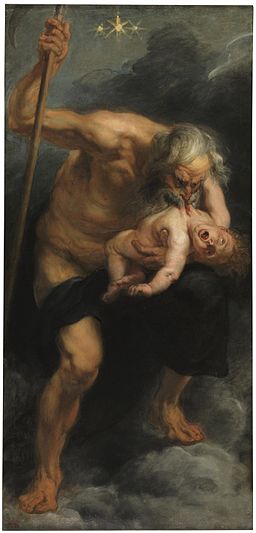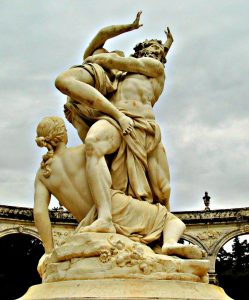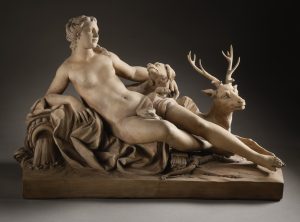The Titans may well represent the lingering deities of the Phoenician culture that inhabited parts of what is now Greece before the Mycenaeans, which we think of as the Classical Greeks.
Kronos himself suffers from confusion with the Roman Chronos, who is Old Father Time. There’s no kind of clarity whether they’re the same deity or two different ones, because different Classical writers treat the matter in one of three basic forms.
He’s either Cronus or Kronus or Kronos (as with many periods of history, spelling in the alphabetical systems was inconsistent – most things weren’t written down so those who could write had to work out certain words for themselves) He is the husband of Gaia, or her son, or both. I’ve gone with the son version, because it fits with most of the common tales, and makes the following story make more sense.
Story of the Titan – Beginnings
In the beginning was Chaos, and Chaos brought forth Gaia, which is the Earth, and she brought forth Uranus, which is the sky.
And Gaia and Uranus married, and had many offspring – giants and monsters of all kinds. And the greatest of these was Kronos, and Rhea was his wife.
Uranus displeased his wife however, for he did not care for all of her children. The Hekatonkheires and the Cyclopes displeased him with their strange forms, and he threw them into Tartarus where he would never again have to look upon them.
Kronos was the only of Gaia’s children both strong enough and brave enough to fight against the tyrant Uranus, and so he freed his imprisoned brothers and sisters and marched against his father, striking him down and castrating him with a great stone sickle.
Kronos was not content however – he knew that the Cyclopes and Hekatonkheires were willing to fight against their lord, and he was now their lord. And so he repeated the actions of his father and imprisoned them in Tartarus.
It was this act that led his mother Gaia to prophecy that as he had repeated his father’s crimes he would repeat his father’s death – Kronos’ son was destined to overthrow him. So as his wife Rhea gave birth to each child he swallowed them whole.
When Zeus was born, Rhea could take it no longer and so she bundled a stone in swaddling clothes and handed it to Kronos, hiding the boy on Crete.
Zeus grew until Crete could no longer hold him, and Zeus went to rescue his brothers and sisters. He wrestled with Kronos until he could force an emetic on him. His disgorged brothers and sisters then launched a vast war to overthrow the Titans, armed and equipped by the Cyclopes. When the Titans were dead or subdued, the Olympians carved up the universe between them.
Zeus became King of the Sky, and his brother Poseidon became Lord of the Sea. The third brother Hades became Lord of the Underworld. Their sister Hera became queen of marriage and childbirth. Demeter took the growing of crops for her domain, and the last sister Hestia claimed sovereignty over the Hearth.
Kronos was imprisoned in Tartarus below the earth. There he waits, scheming revenge against his son, and the mortals who are ruled by him.
In your stories and games
Summoning the Big Bad Thing is a favourite of cultists and sorcerers everywhere. Whether a Titan, a Great Old One, or a more earthly monster, the Big Evil is usually a ritual to be interrupted. For an excellent example of this kind of titanic struggle (sorry) in gaming, take a look at the Age of Mythology: Titans expansion.
On the other hand, what if the party are trying to get rid of a god? It’s possible that summoning such Things might be necessary if the aim of the plot is deitycide. Of course, one you’ve summoned it, there’s no guarantee that Kronos will do what you ask – he is a force of nature. And how does one breach the walls of Tartarus anyway?
Some of the myths provide another reason one might wish to bring back the Titans – During their rule humanity was stronger, freer and more moral than the people of the modern world. The Titans, unlike the gods, felt no need to interfere in the lives of mere mortals and their power flowed more freely into the world.
The Titans don’t have clerics or paladins, but some settings might see them as the granters of elemental magics. Kronos is majestic, and so might indirectly grant spells of mastery or even metamagic. But he is unlikely to commune directly – more likely there is some quality of the power that binds him that allows his power to be siphoned.
If you’re looking for some new deities and primordials for your world, you may want to pick up this month’s Jigsaw Fantasy – The Royal Panoply of Annem Ka



